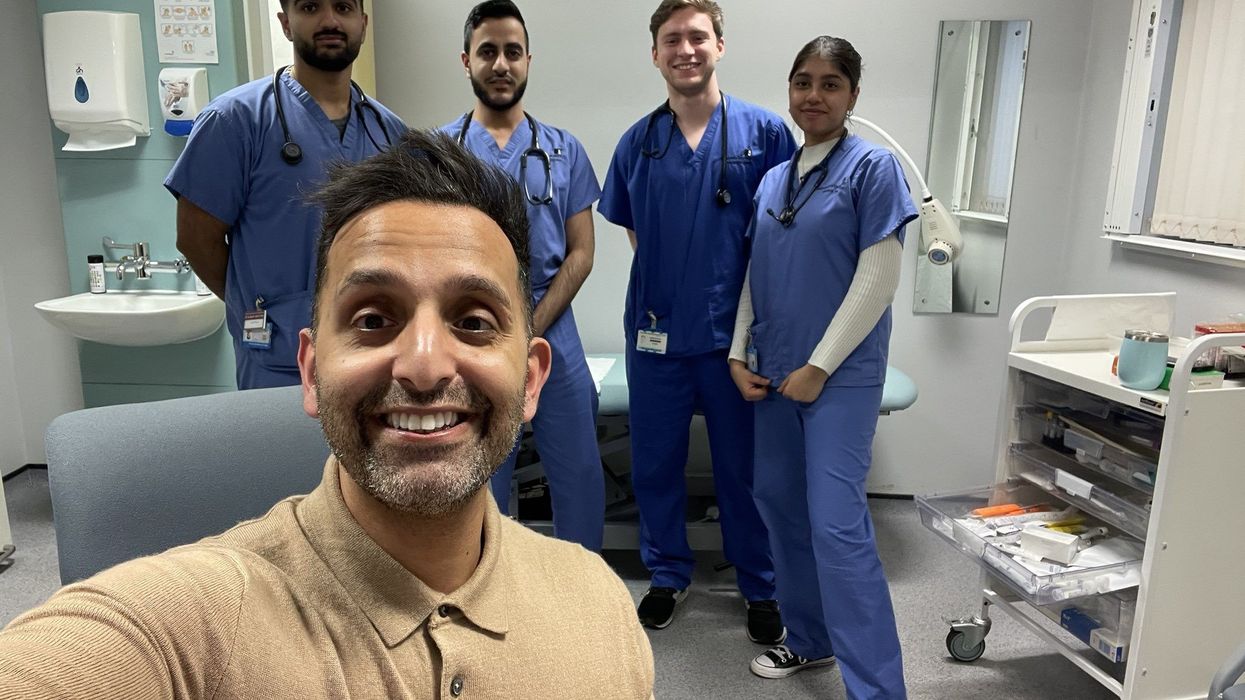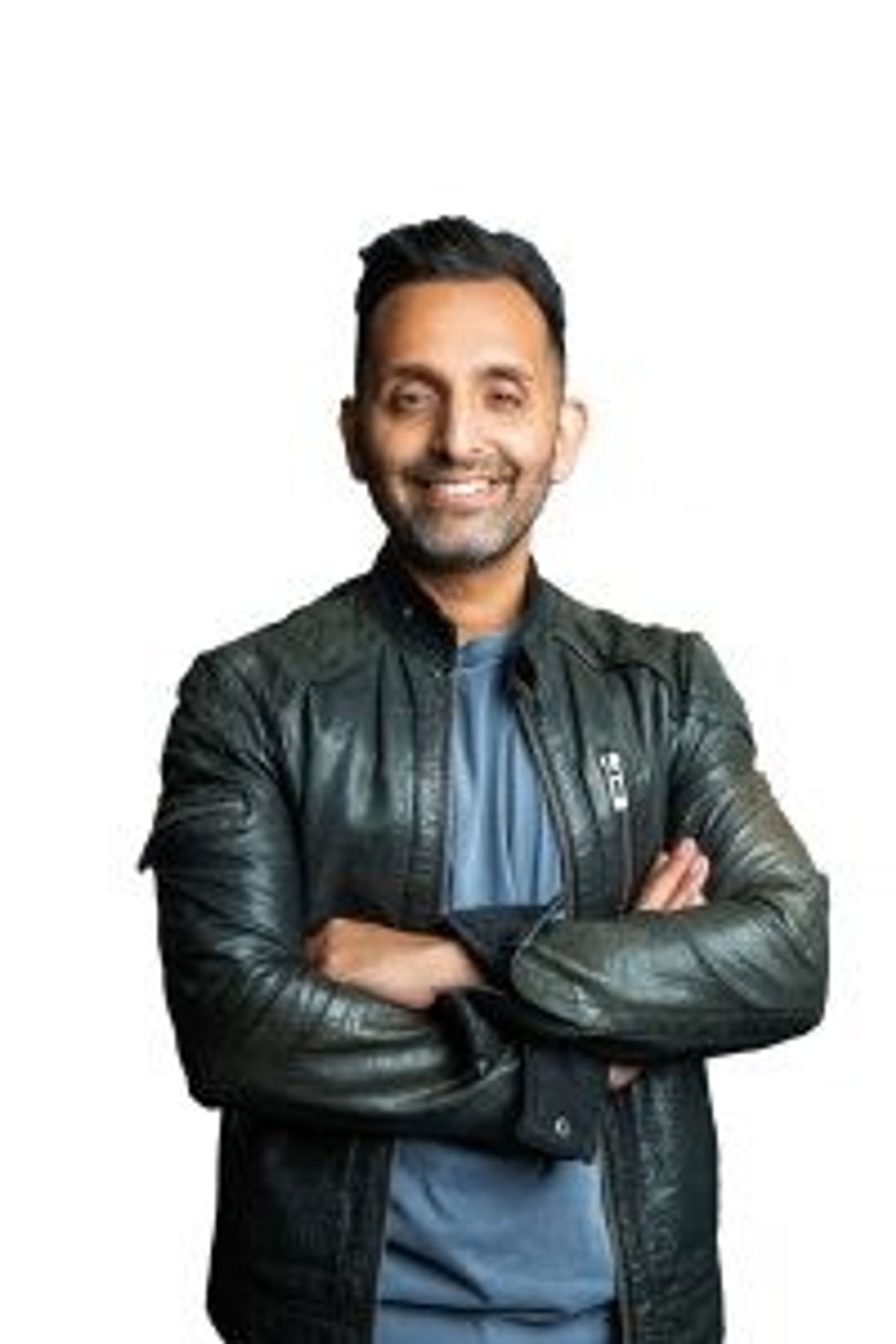AMIR KHAN, the TV doctor, admits that he delved into parts of his own life in writing his first novel, How (Not) To Have An Arranged Marriage.
Khan is a familiar figure to audiences, with regular appearances on Lorraine, This Morning and Good Morning Britain. He has also been in documentaries such as Dr Amir’s Sugar Crash and You Are What You Eat.
As a second-generation British Asian, the 42-year-old says exploring the theme of arranged marriages was his way of looking at how Asian culture has evolved within UK society.
“I wanted to write something about south Asian culture, how it has come over to Britain. Sometimes friction can happen, but also things we can celebrate,” Khan tells Eastern Eye.
“I thought, ‘what part of it is really interesting? How can I get all the beauty of our culture across?’ The answer was the marriage process – how we’re really good at it and how we work as a community.
“I feel the way it shines through the most is through arranged marriages, and this idea of helping people find matches in a really positive way.”
He adds: “The other thing I wanted to do with this book is try to dispel any myths and misconceptions around the idea of arranged marriages getting mixed up with forced marriages, which are very, very different and illegal. Arranged marriages can be something quite celebratory and wonderful, if they work well.”
How (Not) To Have An Arranged Marriage follows the life of Yousef, a young Muslim student doctor whose life has been planned out by his family. He will become a doctor, marry a suitable girl of his parents’ choosing and, above all, make his family proud.
But Yousef’s life takes a turn when he falls in love with Jessica, and is torn between his traditional family and his heart. “It’s loosely based on some of the experiences I’ve had. It’s definitely a work of fiction, but you draw from your own experiences, as most writers do,” says Khan.
“I know the world of medicine and the world of hospitals. A lot of the drama is based in a hospital setting because the girl he really wants to marry, Jessica, is a doctor as well. He’s got an onoff relationship with her while he’s seeing girls that his mum and aunties have set up for him.
“I think lots of people can relate to this scenario. I wanted to tell the story about a culture and setting that I knew and understood.”
Asked if he went on blind dates set up by his family, Khan laughs and says, “Oh my God, yes, loads. Every single one was a disaster. My heart wasn’t in it at the time and then when I did think I had found someone, I messed it up.
“The disastrous dates in the book come from my own experiences. There is nothing more awkward than putting on your best clothes, getting into the car with your mum, your dad and your sisters, heading over to a random stranger’s house and meeting her and her family.”
Khan, who is from a British Pakistani Muslim background and is currently in a relationship, adds: “You’ve been told for most of your life, ‘don’t talk to girls’, but then all of a sudden, you are supposed to bring your A-game and your banter in front of all of these people – it is a nightmare.
“Then there’s that awkward moment where someone goes, ‘oh, by the way, can you two go in another room (to get to know each other)? It’s just so horrendous. But I wanted to capture all of that because it’s such a bizarre thing to go through, but we still do it all the time.”
In the book, there are three young couples who get married. For some of them, the arranged marriage process works, while for the others it doesn’t. In Khan’s own life, three of his six sisters had arranged marriages and three did not.
“It can work and that’s what I wanted to get across. This book is very supportive of the idea of arranged marriages. If they are done properly and with everyone on board, I think they can work because you never know who you’re going to meet in one of those random introductions. Everybody’s just wanting to find the right person, their intention is generally very good.
“It’s worth keeping this as an option. You might find someone yourself, you might use the dating apps or the marriage apps, but keep this option open as well. If you’re looking for someone, cast your net wide, and that is how you’re going to catch someone.”
For the past decade, Khan has been one of the most prominent doctors on television. His work includes the documentary Dr Amir’s Sugar Crash, when he tried to become a sugar addict by eating vast quantities of processed sugar while demonstrating the impact of sugar on people’s health.
He appeared on You Are What You Eat as a GP, helping to transform some of the UK’s most disastrous eaters.
In addition, Khan has hosted other shows, including The Science of Sleep, How to Lose a
Stone in a Month and The Great British Urine Test.
However, despite his growing media-related work, Khan remains a dedicated GP based in West Yorkshire. He recently celebrated his 20-year anniversary as a medical practitioner.
His first book, The Doctor Will See You Now explored the highs and lows of being a doctor in the UK.
In How (Not) To Have An Arranged Marriage, he also explores the difficulties faced by NHS staff through the eyes of the character Anjali, a trainee doctor who comes to the UK from India.
“I train GPs and I have a lot of the GP trainees under my wing from other countries, and they have a very romanticised idea of what it’s like working in the NHS. And then they come to the UK and the reality is brutally different,” says Khan.
“The way that NHS staff are spoken to, the way they’re treated, how much they get paid, all of this stuff is very different to what they expect and what they might have been told. I wanted Anjali to experience that.
“I feel really sorry for these people who come over on their own and they’re just working in the NHS. Then they go home and they’re on their own – it is really difficult. I’ve had trainees like that, and I wanted to capture that [in the book].”
Khan says NHS chiefs need to do more for trainee doctors who come from abroad.
“If you look at the rates of trainee GPs who are more likely to fail exams or have to re-sit a year or have an extension to their training, they are the people from historically marginalised backgrounds and people from abroad,” he says.
“These people are often left out of pocket because they’re paid very little and then they are paying for exam after exam that costs money. Then they come into work and that’s a very stressful situation for them because they’re having to provide a service while also trying to prepare for exams that they’re likely to fail.”
The NHS workforce is one of the most diverse in the country. Black and minority ethnic (BAME) members make up almost a quarter of overall staff (24.2 per cent or 383,706 staff ) – an increase of 27,500 people since 2021.
More than two-fifths (42 per cent) of all doctors, dentists, and consultants, and almost a third (29.2 per cent) of nurses, midwives and health visitors are from BAME backgrounds.
“The NHS runs because of people from abroad and people who are second-generation immigrants, such as myself. But the only thing you hear in the media is how immigrants are bad and we’ve got to do something about it,” he says.
“I wanted to tell the story of migrant NHS staff from a positive point of view.”





